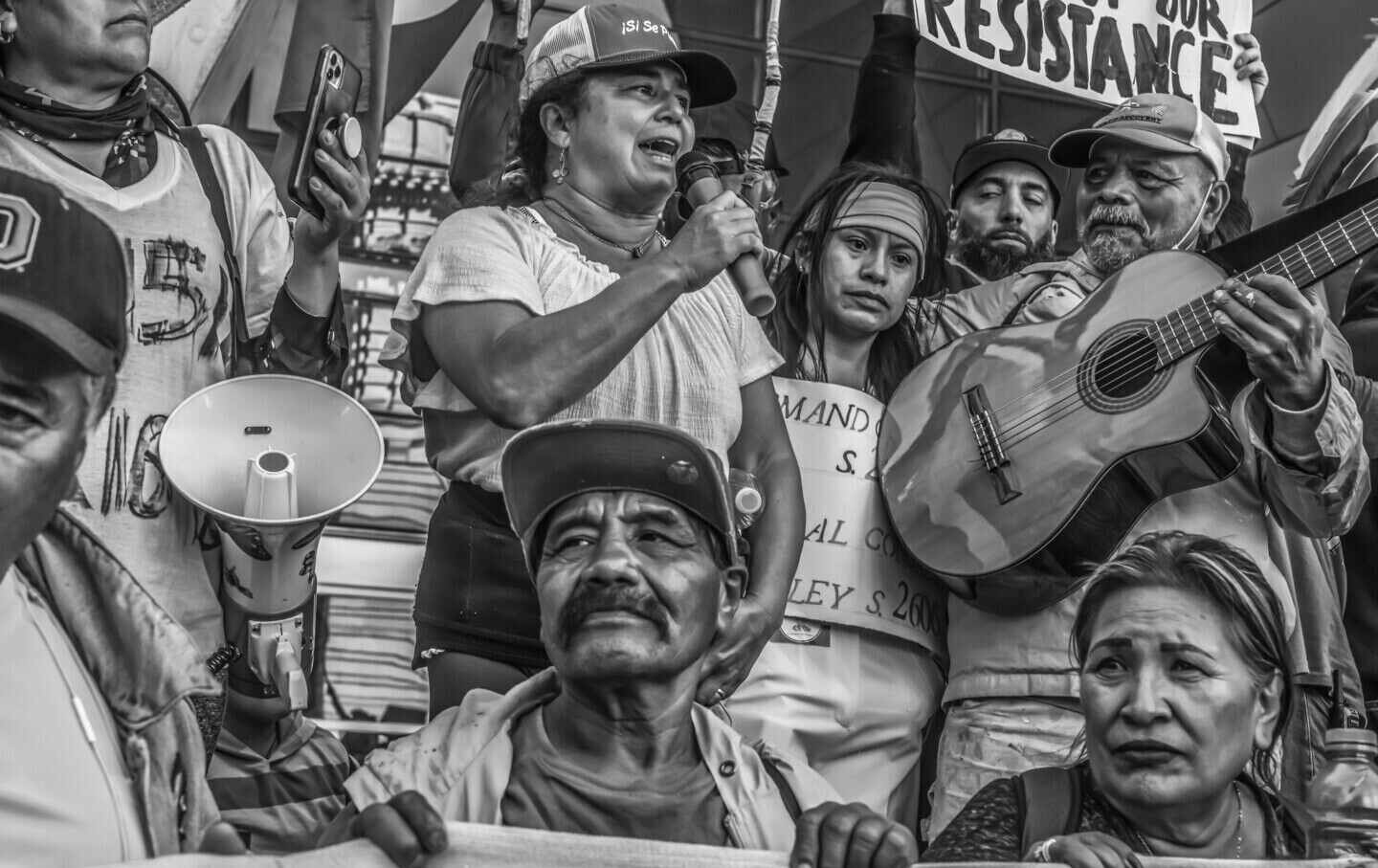
Only a Social Movement Can Win Real Immigration Reform
Activists marched for three days straight, demanding that Congress finally change the immigration registry date.
At the beginning of the 1990s, Sahuayo, a small city of factories and craftspeople near Michoacan’s Lake Chapala, could not provide enough work to support its growing population. People had been leaving Michoacan for years, seeking jobs in the maquiladoras on the border, or in the fields of California’s San Joaquin Valley. But as the North American Free Trade Agreement went into effect, the Mexican government devalued the peso, and a new wave of Sahuayenses were thrown into the migrant stream.
One of them was Patricia Garibay. Her sister and brothers had come north, and at 16 she followed in their footsteps. But while Patricia was able to get residence status, her siblings could not. “More than half their lives have been here—over 30 years,” she says. During that time they’ve been unable to return to Michoacan to see their family. Her sister died here in the US without papers. “Like many others, our family was divided. If the law doesn’t change, they’ll never be able to go back either.”
Garibay found domestic work in Sonoma County, and went on to care and clean for families for the next 30 years. Media stereotypes may lead some to believe that only the rich employ domestic workers. In a world of privatized health care, though, these mostly women laborers, like Garibay, provide essential care for the disabled, for older women and men with no families of their own, and for many who simply can’t care for themselves. According to Renee Saucedo, organizer of the Almas Libres domestic worker collective in Sonoma County, thousands of women doing this work in California are undocumented. Jen Myzel employs domestic workers like Garibay, and is an outspoken advocate for them in marches and demonstrations. She believes they deserve legal status for the valuable work they do.
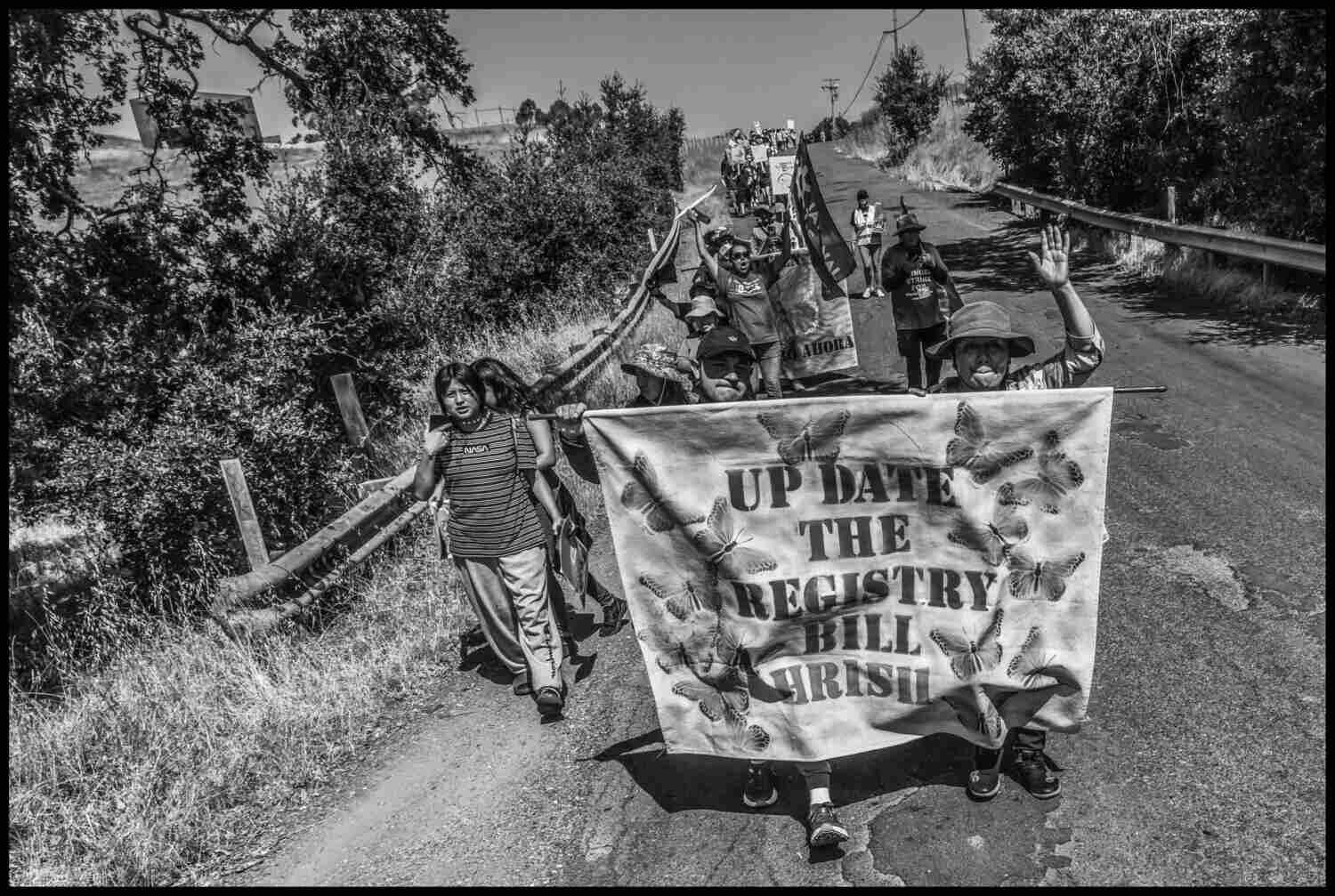
Garibay and Myzel were among several hundred immigrant rights activists who gathered at the beginning of August in Walnut Park, in Sonoma County’s wine country. After listening to a few speeches and cheering on the local troupe of Aztec dancers, they set off on a three-day march to San Francisco’s Federal Building. Their goal was to win support for a bill that could make a profound difference in the life of Garibay’s family. “I’m fighting for them,” she says.”
HR 1511, “Renewing Immigration Provisions of the Immigration Act of 1929,” is breathtaking in its simplicity. It just changes a date: January 1, 1972. Today, anyone who entered the US without a visa before that date can apply for legal permanent residence—the “green card.” After five years as a legal resident, this person can then apply for US citizenship. This registry process is contained in Section 249 of the Immigration and Nationality Act, and the date has been changed four times—from 1921 to 1924, 1940, 1948, and finally 1972.
Unfortunately, for the estimated 11 million undocumented immigrants living in US communities, only a tiny handful qualify under the current registry date. That population is aging out. If someone came to the United States just before 1972, at the age of 20, that person would be over 70 now. From 2015 to 2019, only 305 got legal status. “No one really knows how many have come since that date,” says Saucedo, who helped set up the Northern California Coalition for Just Immigration Reform. “Ninety percent of currently undocumented people is probably an underestimate.”
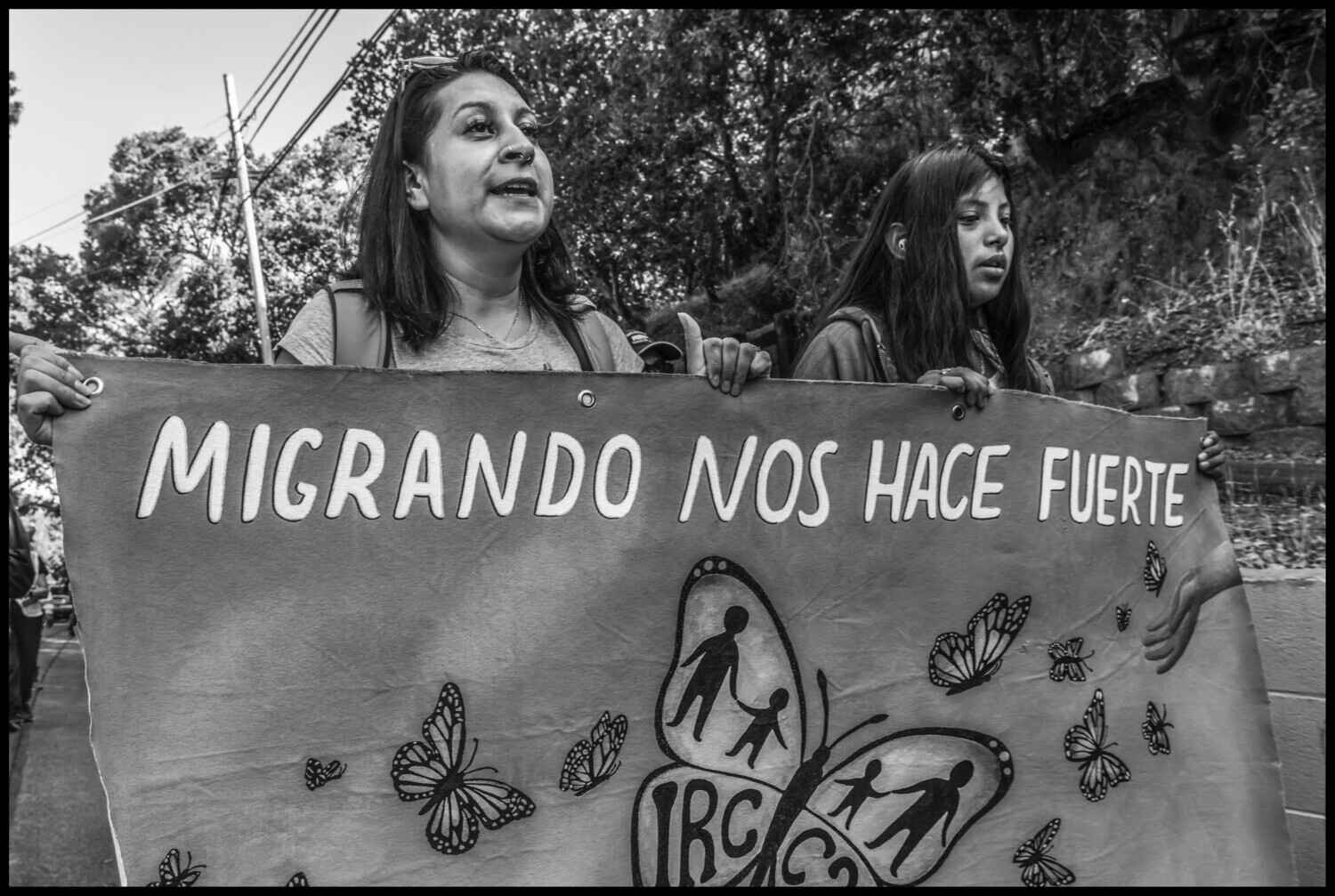
Known as the Registry Bill, HR 1511 would allow anyone in the country for seven years to apply for a green card. Instead of establishing a new fixed date, a person could set the legalization process into motion seven years after they crossed the border.
“Seven years recognizes that by then a person has shown they’re rooted in this country and community,” explains Angelica Salas, executive director of the Coalition for Humane Immigration Reform in Los Angeles, which helps coordinate the national campaign for the bill. “Seven years demonstrates a commitment,” she says. “The same timeframe that legitimizes a common law marriage.”
Another activist on the march, Emma Delgado, a leader of Mujeres Unidas y Activas (United and Active Women) explained. “I haven’t seen my children in many years because there is currently no way for me to apply for legal residency.” She called the family separation produced by current immigration law “immoral.”
The Petaluma–San Francisco march, organized by the Northern California Coalition for Immigration Reform and supported by a handful of local immigrant rights advocates, was one of a dozen around the country. People also walked from Silicon Valley to San Francisco in a similar three-day trek. Other marches were one-day events. Some were followed by a day in which immigrant workers stayed home from their jobs.
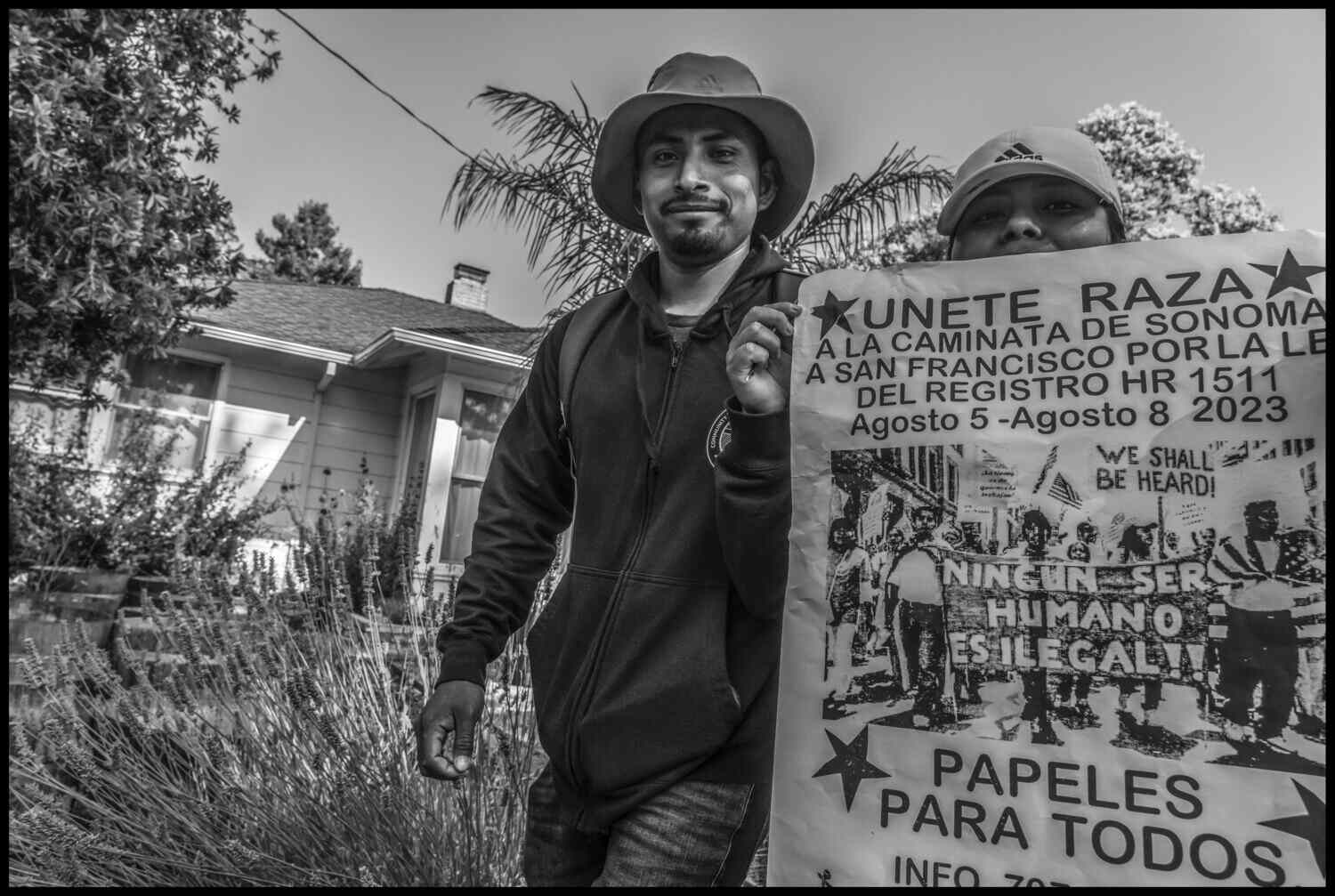
The cities that mounted marches—Houston, Denver, San Diego, Washington, and six others—all have large communities of undocumented people. While the organizers’ ultimate target may be Congress, their immediate purpose was mobilizing undocumented people themselves to act independently in their own interest. That makes this movement akin to the huge immigrant rights marches of 2006.
“Our whole goal is to inform and unite our community,” says Melanie Laplander, of Latinos Associated Together Informing Networking and Outreaching in Minneapolis, part of a network mounting grassroots actions around the country. Saucedo says she underestimated the willingness of undocumented people to march for three days. “Eight million people would get status with this bill,” Saucedo explains. “Of course, we want it for all 11-12 million, but it’s the best we’ve seen in decades. It doesn’t pit people against each other by covering only certain groups, and there’s no exchange of legalization for E-Verify, guest worker visas or beefing up the border.”
Popular
“swipe left below to view more authors”Swipe →Salas recounted a meeting of CHIRLA leaders in Los Angeles in the summer of 2021, in which she asked people to raise their hands if they would be eligible for legalization under more limited proposals of the last several years. Each time she asked, only a fraction of the group indicated they might qualify. But when she explained the proposal to change the Registry date, and asked who would gain status if that became law, everyone in the room raised their hands.
The marches, like the Registry bill itself, mark a change in the way immigrant rights activists believe legalization can be achieved. For 40 years, immigration reform proposals have followed the pattern set by the Immigration Reform and Control Act of 1986 (IRCA). That bill contained a strategic compromise, intended to win over right-wing Republicans and anti-immigrant legislators of both parties.
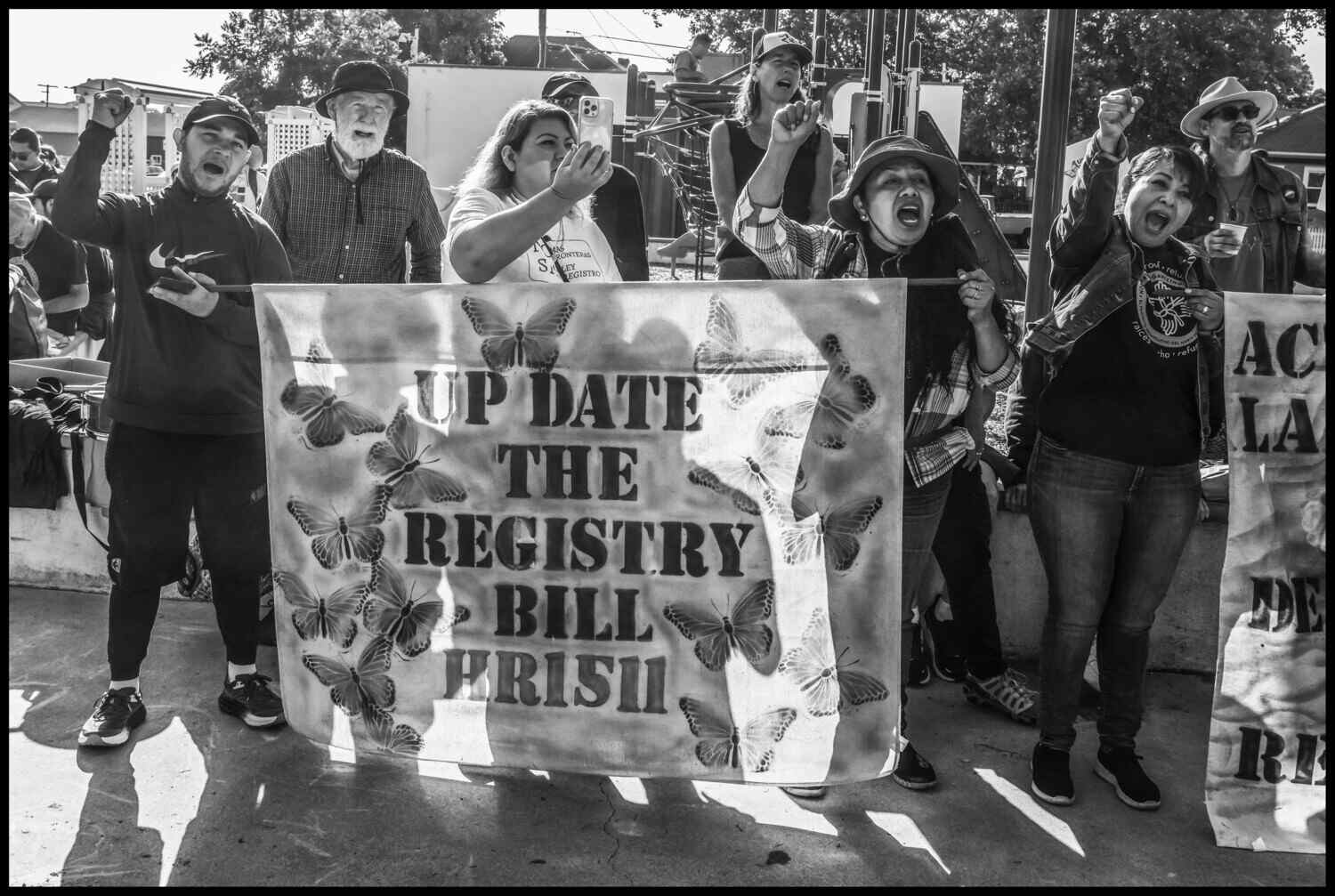
IRCA began the militarization of the border, leading to today’s private detention centers. For the first time, the law made it illegal for an employer, like Myzel, to hire an undocumented person, like a domestic worker. For people without papers, making work illegal made them very vulnerable to employer abuse. At the same time, IRCA reinstituted contract labor visas. Last year, growers filled over 370,000 jobs with temporary workers brought to work in US fields using that system. In exchange, immigrants got a legalization that ultimately allowed 2.7 million people to normalize their status. Republican President Ronald Reagan signed the bill.
Every major comprehensive immigration reform bill since then has embodied the same tradeoff: enforcement against the undocumented and migrants at the border, plus more guest workers, for very limited legalization. The tradeoff sought to make reform palatable to fearful legislators. Every such bill failed.
“Not only did we not get legalization,” Saucedo charges, “but the worst parts of those bills became our reality on the ground—raids, mass deportations, detention prisons and divided families. Today, we have enforcement we never even dreamed possible in the 90s. How could anyone expect to get a significant number of the undocumented to take risks to build a movement for proposals that were causing them harm?” At the same time, disagreement in immigrant communities has grown over proposals that would provide legalization for some people, but not others.
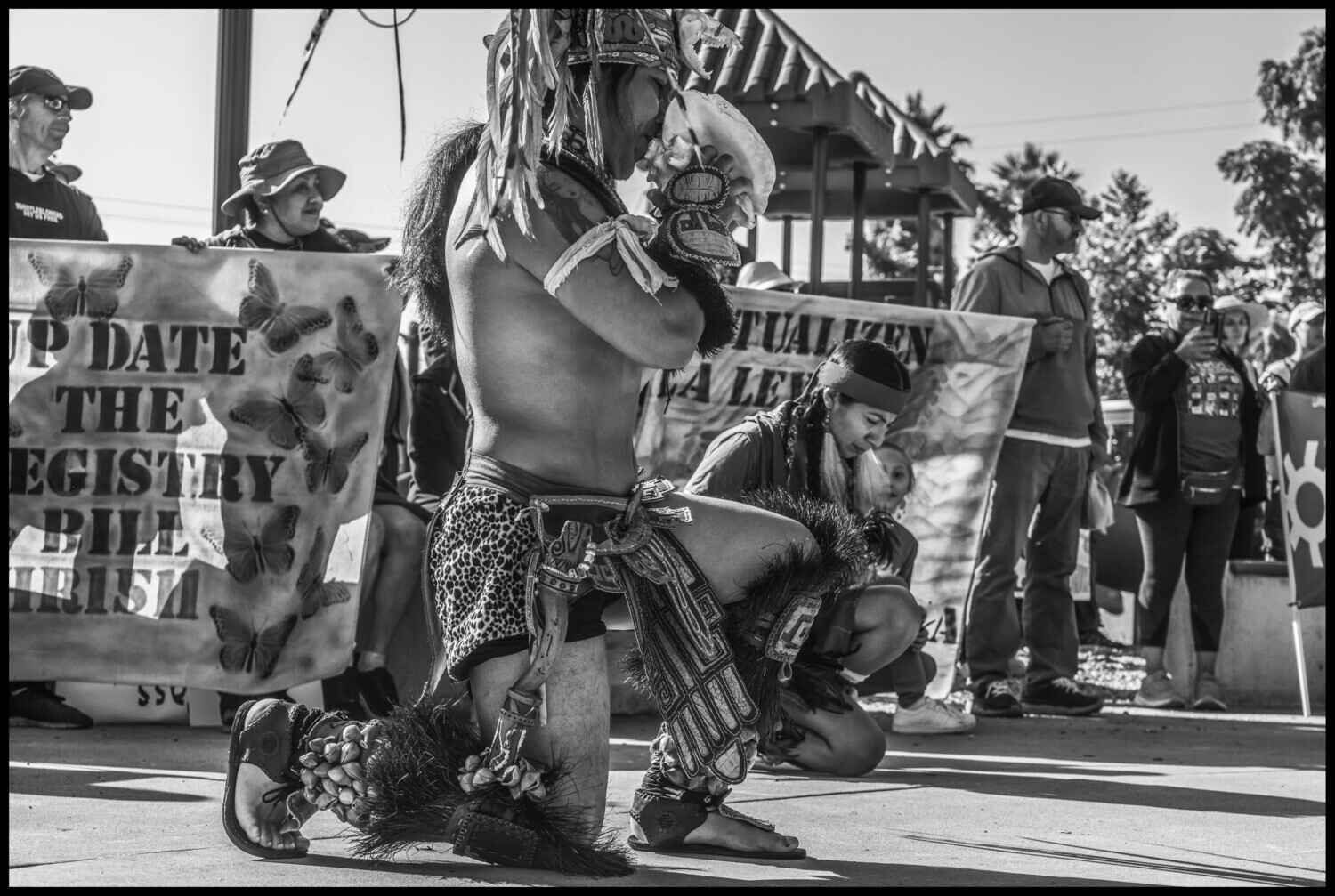
Deferred Action for Childhood Arrival, an executive order issued by President Obama, enabled students brought to the US as children to get a provisional form of legal status. Their parents, however, remained as undocumented as ever. The failed Farm Workforce Modernization Act sought to provide legal status for farmworkers, and other bills promised it for essential workers as a reward for their dangerous labor during the pandemic.
The compromise strategy began to fall apart when Joe Biden was elected as president. He promised a broad legalization during his campaign, and progressives in Congress took him at his word. Salas worked with the Biden transition team, putting an agenda together. The key point was changing the registry date, and she and her colleagues tried to get it into Biden’s US Citizenship Act, without success. “But it was important to show legislators a way to transform our system, and make it humane and functional, instead of concentrating on incarceration and deportation,” she recalls
They tried again with the original Build Back Better bill. “It was there, in the first iteration. If there had been a vote on it, registry change would have passed. We were so close.” But the vote didn’t happen. “Not only did everything fall apart, but registry was used as the excuse for not going forward—that the bill wouldn’t get past the [Senate] Parliamentarian. Registry was stripped out overnight. After the devastation of that moment, we knew we had to have a bill that would deal with registry alone.”
Some proposals called for “earned legalization,” derisively referred to as “parole” by many activists, in which undocumented people would face a decade-long tortuous process giving people only a provisional status, while eliminating millions of potential applicants. “We don’t want temporary programs,” Salas emphasizes. “We want access directly to green cards. There are more and more programs now with a quasi-legal, temporary worker status, but we have to talk about the longevity of our people’s presence here,” she says. “It’s our country already.”
According to Salas, three Democratic Representatives from California drove the proposals for including registry—Zoe Lofgren (San Jose), Norma Torres (Ontario) and Lou Correa (Anaheim). They introduced a registry bill in July 2022, and reintroduced it as HR 1511 this March. Today, that bill has 64 cosponsors, all Democrats. Two more joined the day after the Petaluma and San Jose marches reached the Federal Building. On July 27, 2023, California Senator Alex Padilla introduced a companion bill in the Senate, S 2606.
“Anything you can do to convince lawmakers about the importance of this bill is helpful,” Representative Lofgren told the marchers. “I appreciate the walkers and all those who continue to fight for the rights of our immigrant community. Count on me to continue the fight in Congress!”
Lofgren’s spokesperson, however, recognizes that “because Republicans have the gavel in the House, there’s no foreseeable movement there. Democrats have a one-vote majority in the Senate, but not enough to overcome a filibuster.”
Supporting registry change makes sense in Representative Jesus “Chuy” Garcia’s Chicago district, where 41 percent of the people are noncitizens. “Nearly 300,000 of my constituents have lived and raised families in the US for decades,” he says. “Updating the Registry law will help restore basic safety and dignity for immigrants who have been contributing to our communities for a long time.”
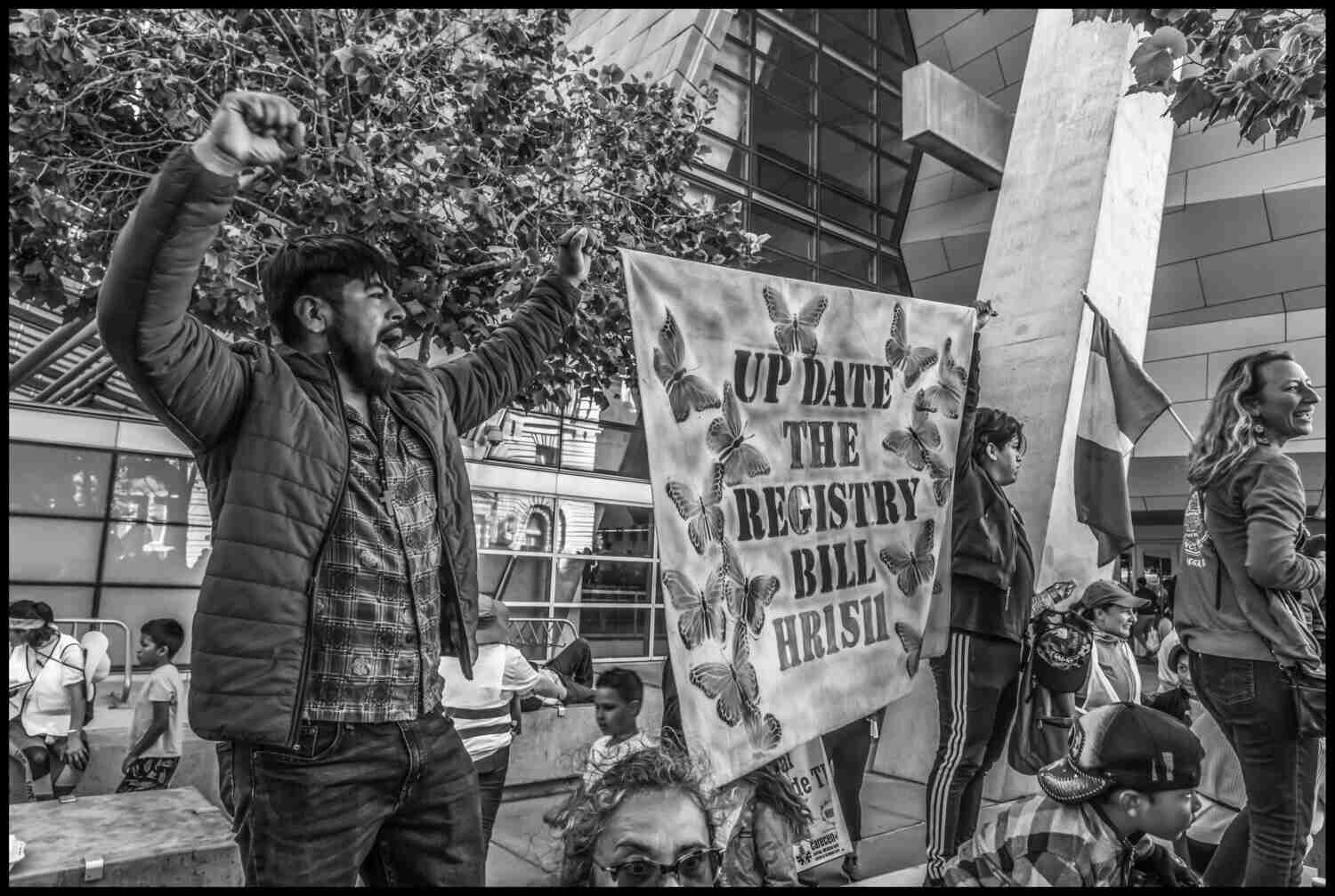
In meantime, however, the undocumented especially face a growing wave of anti-immigrant legislation. SB 1718, for instance, passed by the Florida legislature and signed by Governor Ron DeSantis in July, penalizes employers for hiring undocumented people. It invalidates out-of-state driver’s licenses for immigrants, while making it a felony for anyone to give a ride to a person without papers. Hospitals must ask about immigration status, and detained immigrants must provide DNA samples.
Grassroots activists like Saucedo and Laplander believe that fighting for the Registry Bill is a way to mobilize communities in their own defense, giving them something to fight for as well as fight against. “Politicians say they want to get rid of the 14th Amendment, and take away the citizenship of our children,” Laplander says. “The laws are completely against us. Look at the barbed wire and inhumanity at the border. We have to inform our people of the danger we’re in, to unite and protect each other.”
For Saucedo, only a grassroots movement that starts in undocumented communities will be able to defeat these attacks and at the same time force consideration of real reform, like the Registry Bill. “It has to involve public actions, three-day walks every month, civil disobedience—that level of activity,” she says, “to make the country feel uncomfortable. Undocumented people have to share how their lives are impacted, that no one should be separated from children or elderly parents. We’ve learned from the labor and African American civil rights movements that it takes great urgency and resistance and sacrifice to make mainstream decision-makers shift.”
Salas, with a long history of working inside Washington’s halls of power, challenges the idea that a Republican majority in the House and weak support from many Democrats dooms the Registry Bill. “The more people who are involved, the better chance we have,” she urges. “We can’t depend on political winds or what people tell us is possible. We have to be tenacious for what’s just and righteous.”
More from The Nation
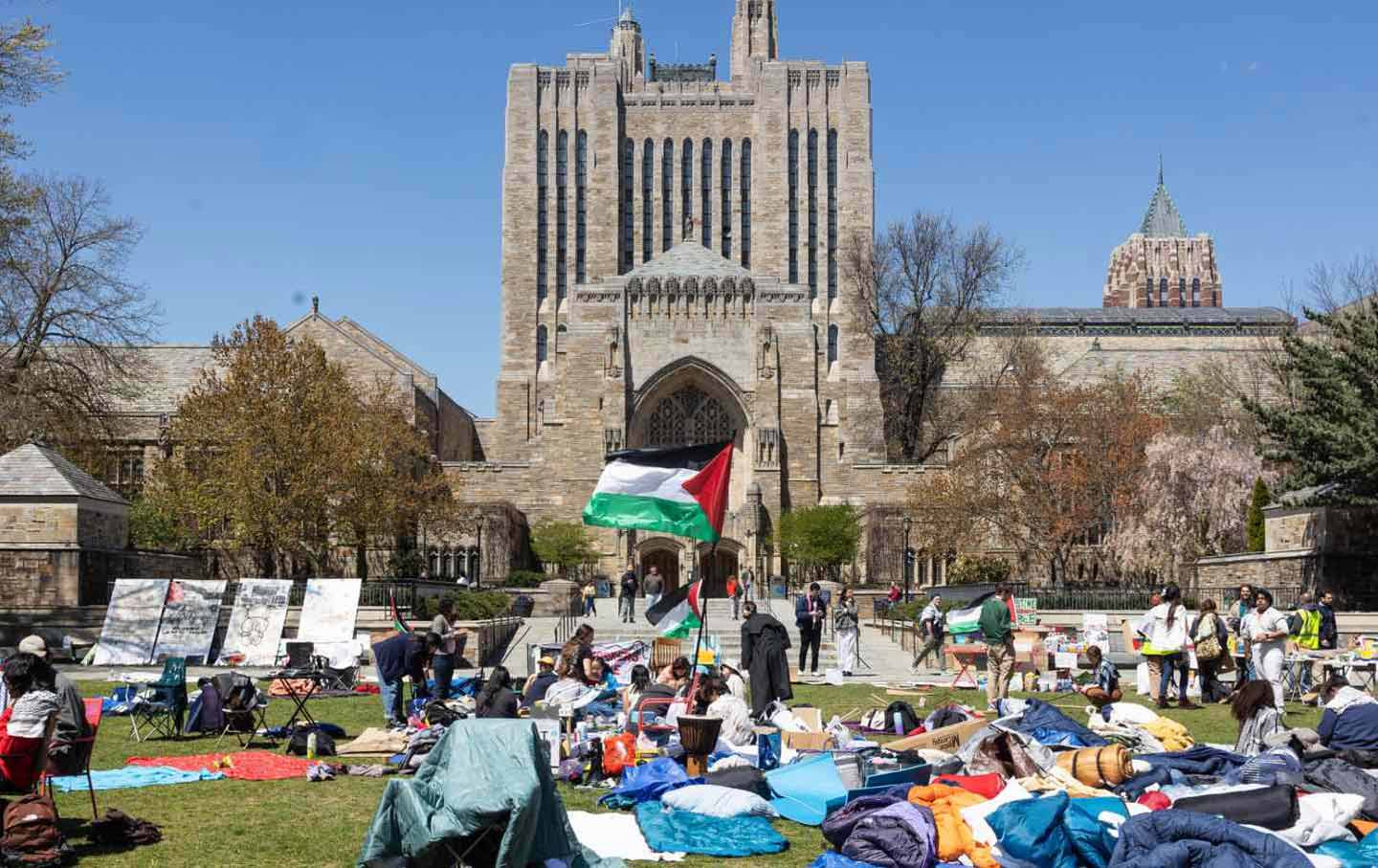
Yale Students Voted to Divest, but What’s Next is Unclear Yale Students Voted to Divest, but What’s Next is Unclear
The referendum calls on the school to divest its $41 billion endowment from military weapons manufacturing firms, yet the power to do so is in the hands of the board of trustees.
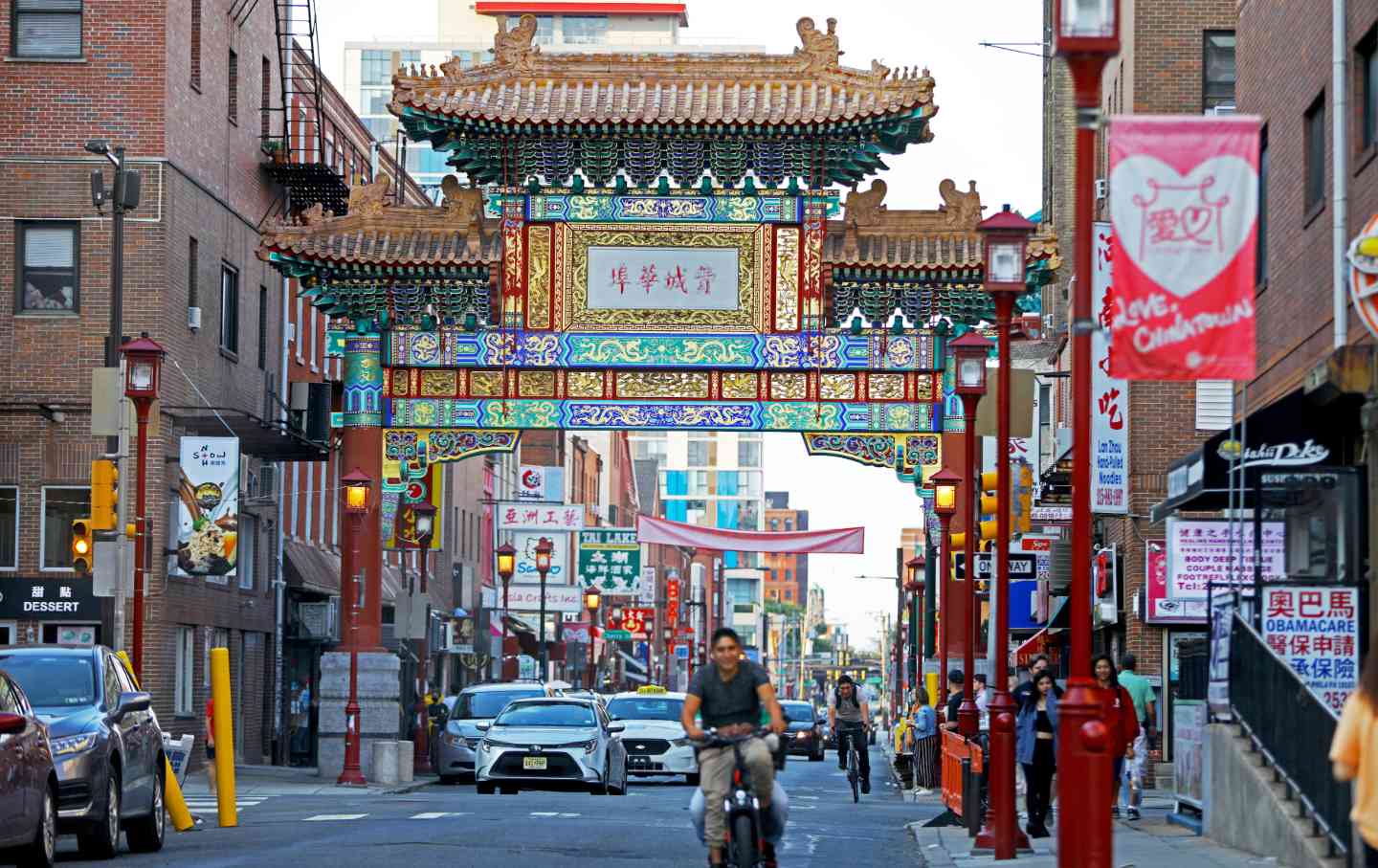
The “Save Chinatown” Coalition Goes on the Defensive in Philadelphia The “Save Chinatown” Coalition Goes on the Defensive in Philadelphia
The construction of a new basketball arena threatens to fill the neighborhood with more traffic and raise rents.

Human Rights for Everyone Human Rights for Everyone
December 10 is Human Rights Day, commemorating the anniversary of the Universal Declaration of Human Rights (UDHR), one of the world's most groundbreaking global pledges.
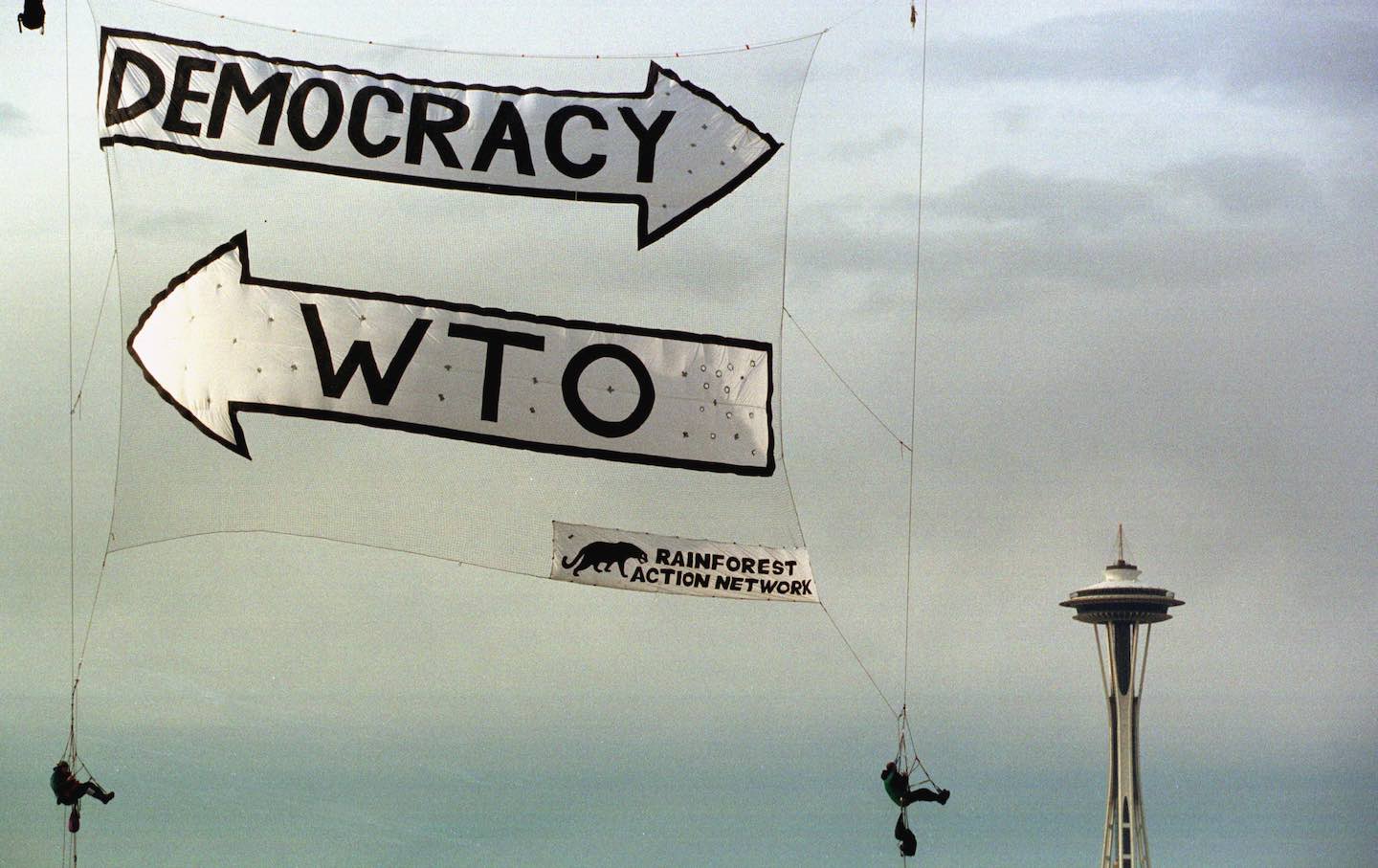
25 Years Ago, the Battle of Seattle Showed Us What Democracy Looks Like 25 Years Ago, the Battle of Seattle Showed Us What Democracy Looks Like
The protests against the WTO Conference in 1999 were short-lived. But their legacy has reverberated through American political life ever since.
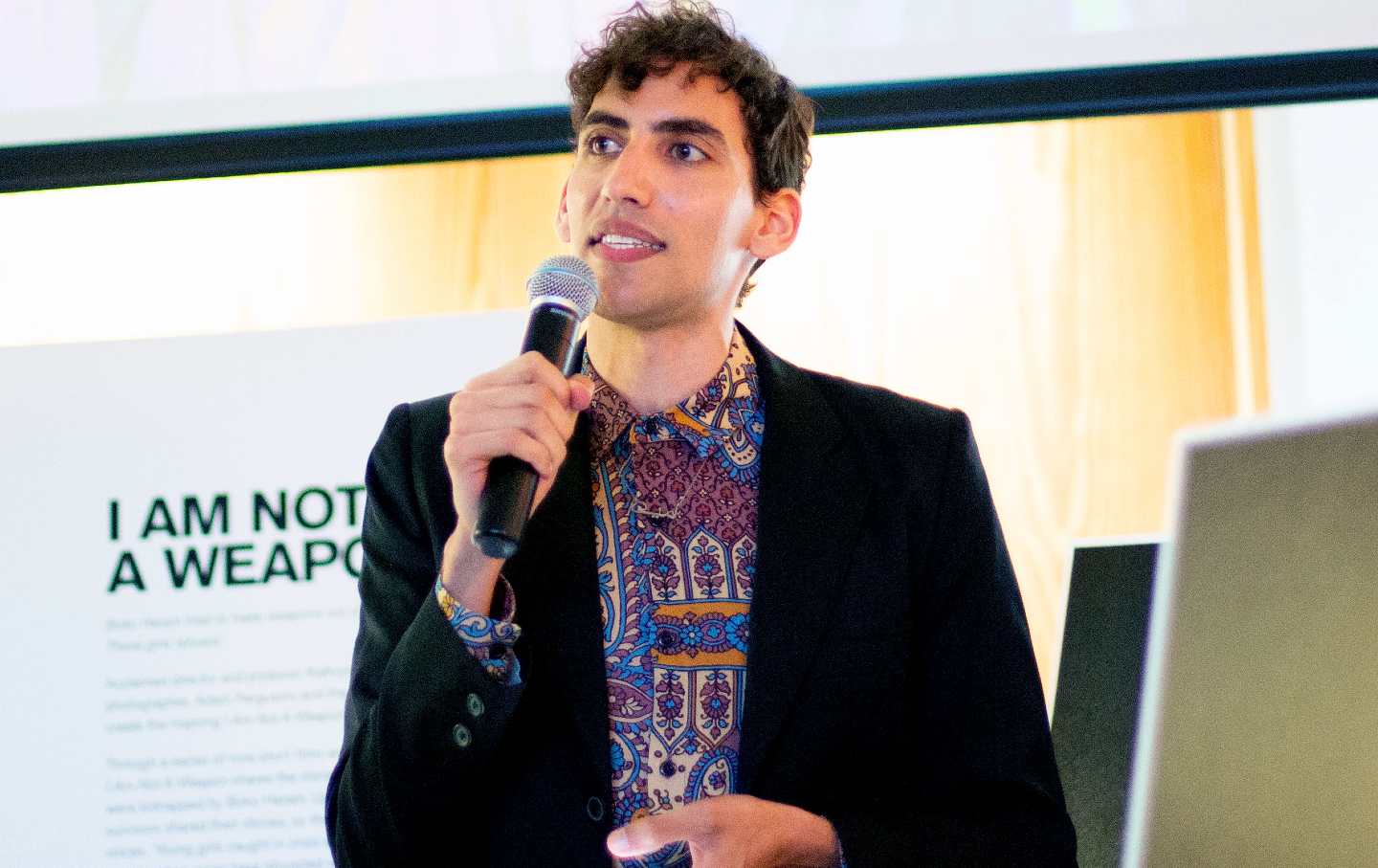
Hollywood’s Vocal Actors Union Goes Silent on a Gaza Ceasefire Hollywood’s Vocal Actors Union Goes Silent on a Gaza Ceasefire
Amin El Gamal, head of SAG-AFTRA's committee on Middle Eastern and North African members, has advocated for a statement supporting a ceasefire in Gaza—so far without success

The Mirabal Sisters The Mirabal Sisters
Patria, Minerva, and María Teresa Mirabal were sisters from the Dominican Republic who opposed the dictatorship of Rafael Trujillo; they were assassinated on November 25, 1960, und...


